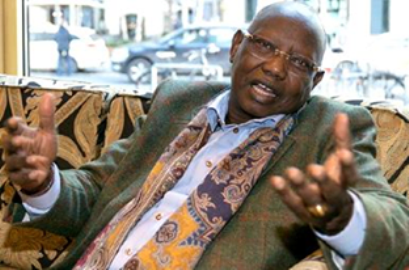South Sudanese politician seeks to assist his country’s refugees in Sudan
June 24, 2016 (KHARTOUM) – Former South Sudanese presidential adviser, Costello Garang Ring said he would request the Sudanese authorities to allow him establish an aid group to assist South Sudanese refugees in Sudan.

He said the South Sudanese refugees suffer from dire humanitarian situation, saying he would apply for the Sudanese authorities to establish an aid group under the name of the Nile Organization for Relief and Reconstruction.
The South Sudanese politician who chairs the New Sudan Foundation pointed that the Sudanese authorities have reservations on the work of the foreign aid groups due to their interference in the internal political issues, saying that has urged him to seek to establish an aid group to assist the South Sudanese refugees in Sudan.
Immediately after the first arrest warrant of the International Criminal Court (ICC) against Sudan’s president Omer al-Bashir in March 2009, Sudan expelled 13 aid groups from Darfur accusing it of collaborating with the war crime courts.
Since then, the activities of foreign aid group in Darfur are strictly controlled and more organizations were evicted through the years. The government also banned the access of foreign groups to the rebel-held areas in South Kordofan and Blue Nile.
According to the United Nations, over 221,000 South Sudanese have fled to Sudan since violence broke out in South Sudan in December 2013. Nearly 40 per cent have settled in White Nile State, with the remainder primarily in Khartoum, West and South Kordofan states.
Since late January 2016, there has been a surge in the number of South Sudanese fleeing into Sudan. As of 12 May, about 45,500 refugees had arrived in East Darfur, of whom some 28,100 are in Khor Omer internally displaced persons (IDPs) camp, of Ed Daein locality.
Over 69,000 South Sudanese have arrived in various locations in Sudan since January 2016 as a consequence to the continued insecurity in the region and food shortage in the South Sudan.
On 17 March, Sudanese government announced a decision that all South Sudanese in Sudan are to be treated as foreigners, instead of ‘brothers and sisters’ as they were previously regarded.
South Sudan broke away from Sudan in July 2011 and established its own independent state after decades of war between the two former northern and southern regions of one country.
SOUTH SUDAN’S PEACE AGREEMENT
Meanwhile, Ring said that the peace agreement didn’t address the root causes of the conflict in South Sudan pointing that the government which has been formed according to the deal is not actually “a national unity government” but “a government for the unity of the ruling Sudan People’s Liberation Movement party”.
“How could the current government be [called] a national unity government while it [only] includes one party that has been divided into three groups who [agreed to] share power ..? We could call it a government for the unity of the SPLM,” he said.
The conflict in South Sudan erupted in mid-December 2013 between forces loyal to President Silva Kiir Mayardit and those backing former vice president Riek Machar. The violence which quickly spread across the country has reportedly killed tens of thousands of people and displaced millions.
The warring parties signed a peace agreement in August 2015 and President Kiir re-appointed Machar as his deputy in February. The two sides have also agreed to share ministerial positions in the Transitional Government of National Unity (TGoNU).
Last April, four factions of the South Sudan’s former warring parties and political rivals, turned peace partners, formed the (TGoNU) to administer the country for the next two and a half years, pending elections.
Ring stressed that Machar’s life is in great danger because his limited troops in the capital Juba wouldn’t be able to protect him if clashes were renewed.
He added that those who refuse the peace deal don’t want to return to war again but seek to reach an agreement that secures permanent peace and prevents the outbreak of war again.
“The current agreement won’t achieve permanent peace because [distribution of] government positions and power sharing [among few parties] don’t make peace,” he added
He added that the peace deal was not fully implemented despite its shortcomings, pointing to the creation of 28 states instead of 10 states as provided in the agreement besides the volatile security situation in Juba and the ongoing clashes in Raja.
Ring further said that only 5% of Machar’s demands have been implemented so far, noting the latter believes that Sudan’s stability would positively impact on achieving stability in South Sudan.
He revealed that Machar had earlier dispatched him to Paris to meet with the leader of the Sudan Liberation Movement (SLM-AW) Abdel-Wahid al-Nur to mediate between him and the Sudanese government, saying however the latter asked them to provide his movement with the weaponry to invade Khartoum.
Commenting on the future of relations between Sudan and South Sudan, the South Sudanese politician pointed that the two countries could establish a form of unity similar to the European Union by opening the border and allowing freedom of movement and investment until sharing a single currency and one flag and capital city in “Abyei for example”.
Being son of a leading Dinka Traditional Leader, Ring has been active in numerous positions of the SPLM since its formation in 1983, as well as being chairman of the New Sudan Foundation and the White Nile Foundation.
(ST)
